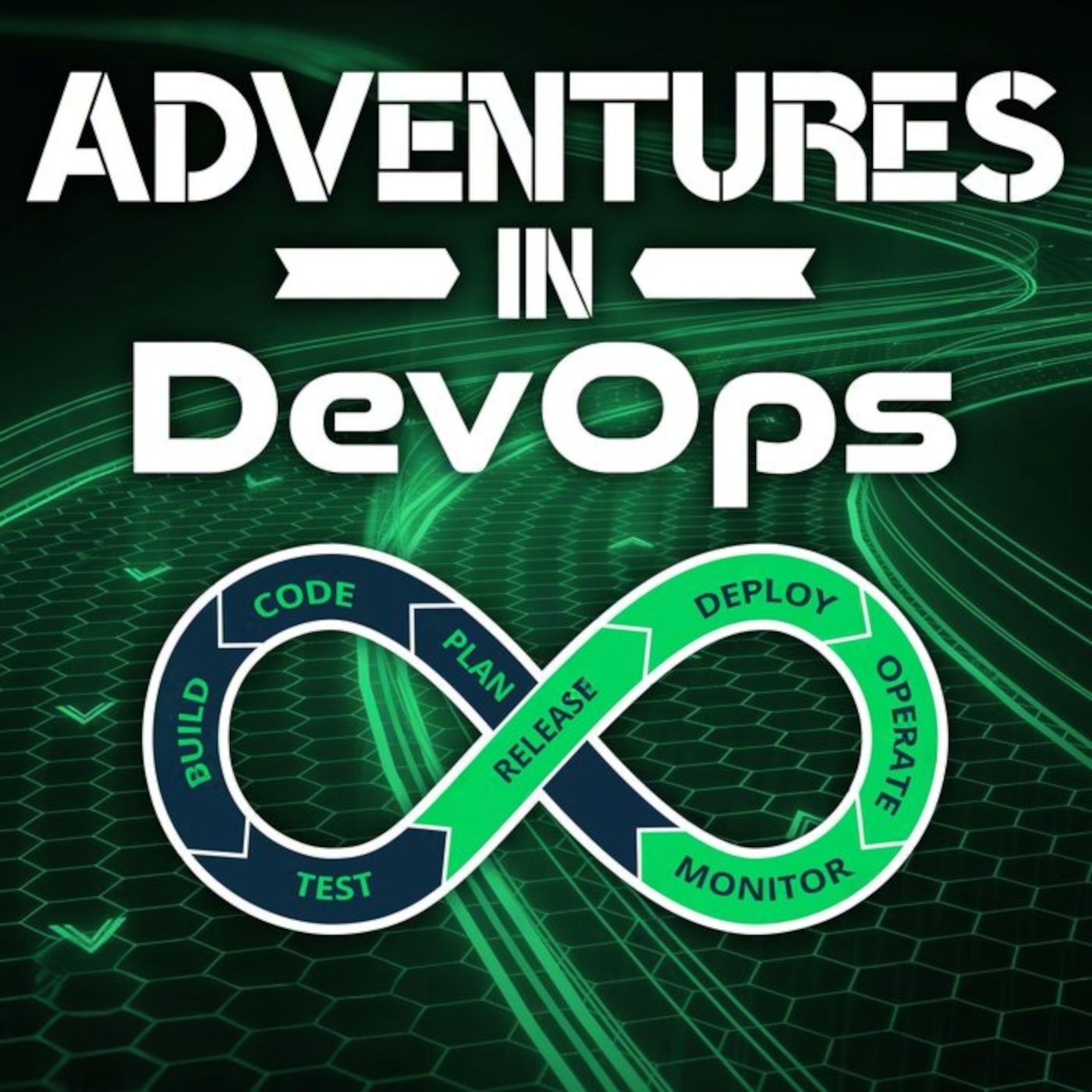

Adventures in DevOps
Will Button, Warren Parad
Join us in listening to the experienced experts discuss cutting edge challenges in the world of DevOps. From applying the mindset at your company, to career growth and leadership challenges within engineering teams, and avoiding the common antipatterns. Every episode you'll meet a new industry veteran guest with their own unique story.
Episodes
Mentioned books

Apr 21, 2020 • 50min
DevOps 031: DevOps, Monitoring, and Cloud Management with Matt Watson
Matt Watson is the CEO and Founder at Stackify. This episode dives into his thoughts and approach to devops, application management, and performance using cloud native tools including Kubernetes.PanelistsCharles Max WoodTyler BirdGuestMatt Watson

Apr 14, 2020 • 60min
DevOps 030: 15 Years of Ubuntu with Martin Wimpress
Adventures in DevOps' guest, Martin Wimpress, is the engineering director for Ubuntu Desktop, Snapcraft and Developer Advocacy at Canonical the company behind Ubuntu. He speaks about Ubuntu, the OS for most public cloud workloads as well as the emerging categories of smart gateways, self-driving cars and advanced robots.PanelistsNell Shamrell-HarringtonCharles Max WoodScott NixonTyler BirdGuestMartin Wimpress

Apr 7, 2020 • 35min
DevOps 029: Kublr, Enterprise Infrastructure Reliability, and Self-Healing Nodes with Slava Koltovich
Slava works at Kublr. They're focused on helping the Enterprise manage the Cloud Native environments. They help those companies manage their Kubernetes infrastructure. Most of their customers are in the financial sector and wind up managing access and security. Slava talks about the challenges and solutions for providing these sorts of tools and managing infrastructure in this way.PanelistsCharles Max WoodGuestSlava Koltovich

Mar 31, 2020 • 55min
DevOps 028: Chaos Engineering with Gremlin Executives
In this episode of Adventure in DevOps, the guests speak about the future of software development and reliable systems. They relate this to Chaos Engineering and why more organizations should be doing it.PanelistsNell Shamrell-HarringtonTyler BirdGuestsTammy ButowKolton AndrusMatt "Forni" Fornaciari

Mar 24, 2020 • 45min
DevOps 027: Quest for Frictionless DevOps with Brent Schroeder from SUSE
Brent Schroeder is the global CTO at SUSE. The discussion begins with a discussion around the open source and devops culture at SUSE. It branches into participation in the CloudFoundry and Cloud Native Computing Foundations. The overarching thing is going beyond development into bringing the Ops into DevOps and removes the friction between Dev and Ops.PanelistsNell Shamrell-HarringtonCharles Max WoodGuestBrent Schroeder

Mar 17, 2020 • 29min
DevOps 026: Implementing Event-driven Microservices with Nikhil Barthwal
Nikhil Barthwal works at Google on Serverless products on Google Cloud Platform. He joins the panel to talk about Implementing Event Driven Microservices. He starts with defining what Microservices are and motivations to move from Monolithic to Microservices. He then dives into distributed data in Microservices and problems associated with it. He goes into details of using Domain Driven Design for partitioning data and solutions to keep data consistent & querying scattered data.PanelistNell Shamrell-HarringtonCharles Max WoodScott NixonGuestsNikhil Barthwal

Mar 10, 2020 • 56min
DevOps 025: Oracle Cloud with Bob Quillin
Bob Quillin is Vice President of Oracle Cloud Developer Relations. He joins the Adventure to talk about the direction of Cloud computing and what's new and upcoming in the Oracle cloud.PanelistNell Shamrell-HarringtonCharles Max WoodGuestsBob Quillin

Mar 3, 2020 • 42min
DevOps 024: Monitoring Multi-Cloud Environments with Sean Porter | Sensu
Sean Porter is the CTO and co-founder of Sensu Inc. Sensu is a project that helps cloud native devops engineers track issues across the cloud and multiple clouds. He gives us the story of where Sensu came from and how it is used now.PanelistCharles Max WoodGuestsSean Porter

Feb 25, 2020 • 52min
DevOps 023: Tools for Issues Resolution with Troy McAlpin and Tobias Dunn-Krahn
Troy and Tobias work at xMatters providing tools that help devops engineers manage things when they go wrong. Their tools at xMatters provide information that makes is easier to track down problems. Running a service like xMattters also allows them to become experts in how workflows should go to empower people to fix issues.Follow UpCloud on Twitter: @UpCloudFollow Troy on Twitter: @TmcalpinxmConnect with Tobias on LinkedIn PanelistNell Shamrell-HarringtonCharles Max WoodGuestsTroy McAlpinTobias Dunn-Krahn

Feb 18, 2020 • 55min
DevOps 022: Debugging Multi-Layer or Multi-Node Applications with Or Weis
Or Weis is the CEO of Rookout. He walks us through the problems of tracking bugs through multiple layers, services, and nodes. He talks about how to aggregate, sort through, and intelligently use the information provided from each of your infrastructure nodes to find problems in your applications. This is the cure for logging FOMO.PanelistNell Shamrell-HarringtonCharles Max WoodScott NixonGuestsOr Weis


